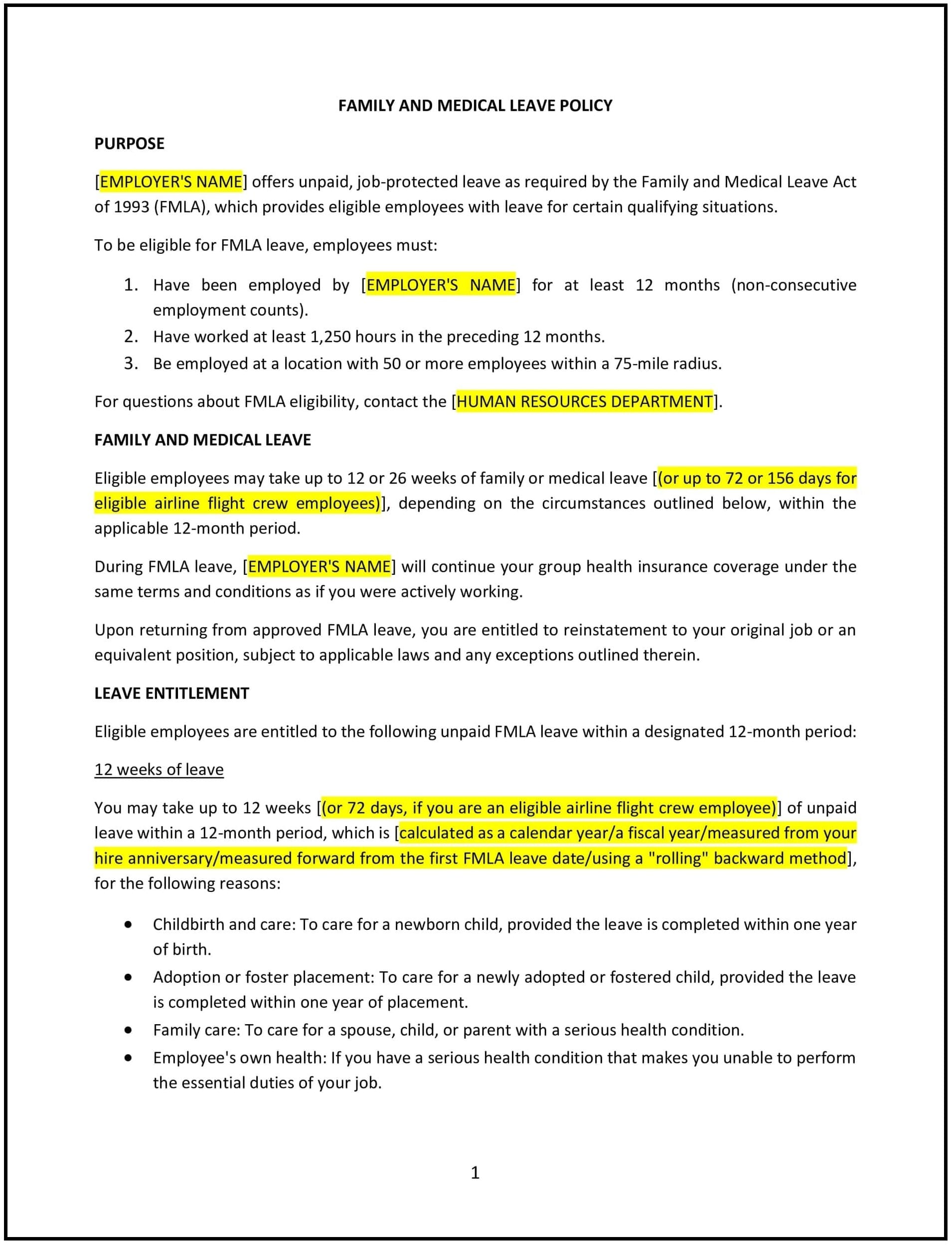Family and medical leave policy (Florida): Free template
Got contracts to review? While you're here for policies, let Cobrief make contract review effortless—start your free review now.

Customize this template for free
Family and medical leave policy (Florida)
A family and medical leave policy helps Florida businesses comply with the federal Family and Medical Leave Act (FMLA) and Florida state laws regarding leave for medical and family-related reasons. This policy outlines the eligibility criteria, the process for requesting leave, the types of leave available (e.g., unpaid, paid, or job-protected leave), and the employee’s rights and responsibilities while on leave. The policy is designed to ensure that employees can take necessary time off for their own health conditions, the care of a family member, or the birth or adoption of a child, while also protecting the business’s operations.
By implementing this policy, businesses can support employees during critical personal and family health situations, comply with legal requirements, and maintain fair and consistent treatment across the workforce.
How to use this family and medical leave policy (Florida)
- Define eligibility: Clearly outline the eligibility criteria for family and medical leave, including the required length of employment, the minimum number of hours worked, and any other conditions that employees must meet to qualify for leave.
- Specify types of leave: Detail the different types of leave covered by the policy, such as leave for personal illness, family care, childbirth, adoption, or other qualifying events. Indicate whether the leave is paid, unpaid, or partially paid, and if any benefits will continue during the leave period.
- Set notification requirements: Explain the process employees must follow to request family and medical leave, including how far in advance they need to notify the business, whether they need to provide medical certification, and any required documentation.
- Address job protection: Specify that employees who take family and medical leave are entitled to return to their original position or an equivalent position, with equivalent pay and benefits, as required by the FMLA and state law.
- Outline the duration of leave: Clearly state the maximum amount of leave that employees are entitled to under the policy, typically up to 12 weeks within a 12-month period, as mandated by the FMLA, and any variations based on state laws or company practices.
- Address benefits continuation: Specify whether employee benefits, such as health insurance, will continue during the leave period and how employees should handle their share of premium payments if applicable.
- Implement confidentiality measures: Ensure that all medical information and leave requests are kept confidential and shared only with individuals who need to know, such as HR personnel or managers responsible for handling leave requests.
Benefits of using this family and medical leave policy (Florida)
This policy offers several benefits for Florida businesses:
- Ensures legal compliance: By adhering to the FMLA and Florida state laws, businesses can avoid potential fines or legal challenges related to non-compliance.
- Supports employee well-being: Providing family and medical leave allows employees to address personal or family health needs without the added stress of job insecurity, leading to improved employee satisfaction and retention.
- Enhances workplace morale: Offering family and medical leave demonstrates that the business values its employees’ health and personal well-being, which can improve overall morale and loyalty.
- Attracts top talent: A comprehensive leave policy can be an attractive benefit for prospective employees, helping the business remain competitive in the labor market.
- Minimizes disruptions: With job protection guaranteed, employees can take necessary leave without fear of losing their job, allowing businesses to plan for temporary staffing needs or transitions with minimal disruption.
Tips for using this family and medical leave policy (Florida)
- Communicate the policy clearly: Ensure that all employees understand their rights under the family and medical leave policy, including the types of leave available, the eligibility requirements, and the procedures for requesting leave.
- Provide training: Offer training for HR personnel, managers, and supervisors on how to manage family and medical leave requests, including how to assess eligibility, handle documentation, and ensure compliance with the policy.
- Monitor compliance: Regularly review family and medical leave usage to ensure that employees are adhering to the policy, and that leave is granted and managed fairly across the organization.
- Plan for coverage: When employees take family or medical leave, ensure that managers have a plan in place to cover the employee’s duties, whether through temporary workers, cross-training other employees, or adjusting workflows.
- Review periodically: Periodically review the policy to ensure that it aligns with any changes in federal or Florida state laws, as well as business needs. Update the policy as necessary to remain compliant and effective.